Hindu Genocide and Islamic Jihad in Bangladesh
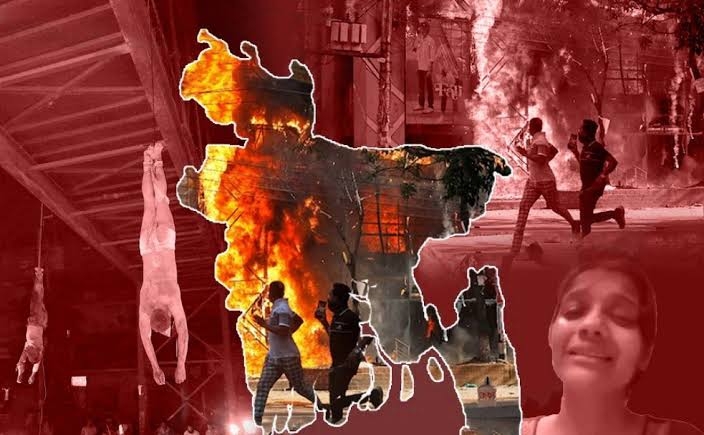
Sheikh Hasina has been compelled to resign and step down as the Prime Minister of Bangladesh under pressure from the military. Three groups have seized control in this power vacuum.
The Bangladesh Nationalist Party, which represents small-scale businesses, has gained significant influence.
Jamaat-i-Islami—Dominated by bureaucratic elements, this group has aligned itself with hardline Islamist agendas.
Tahrir: A radical organisation advocating for the establishment of a caliphate with a history of links to terrorism dominates the Army. This group also aims to transform Bangladesh into an Islamic state under caliphate rule, which is a severe threat to regional stability, particularly for India.
The left-liberal ecosystem appears to be actively collaborating with these three groups and working in coordination to rationalise and legitimise the illegal coup.
After Sheikh Hasina’s resignation, chaos started, and multiple jails were broken into. In which over 1,500 prisoners, including terrorists, were freed by individuals portraying themselves as protesters.

The first-ever Hindu protest in Bangladesh was held on 9 August 2024 to raise voices against the violence targeting the country’s Hindu minority.
In the Gopalganj area, anti-government protests erupted against the Bangladesh interim government. However, the Army initiated a crackdown to suppress these movements, intensifying regional tensions.
After these events, 201 new joint secretaries and several additional secretaries were appointed. Hizb ut-Tahrir is using them to misuse power potentially.
On 26 August 2024, Mufti Jasimuddin, the chief of the Ansarullah Bangla Team, which is an extremist group inspired by Al-Qaeda—was granted bail.
On 5 September 2024, Muhammad Yunus was congratulated by 92 Nobel Prize winners and 197 global leaders for being appointed as the Chief Advisor of the interim government of Bangladesh.
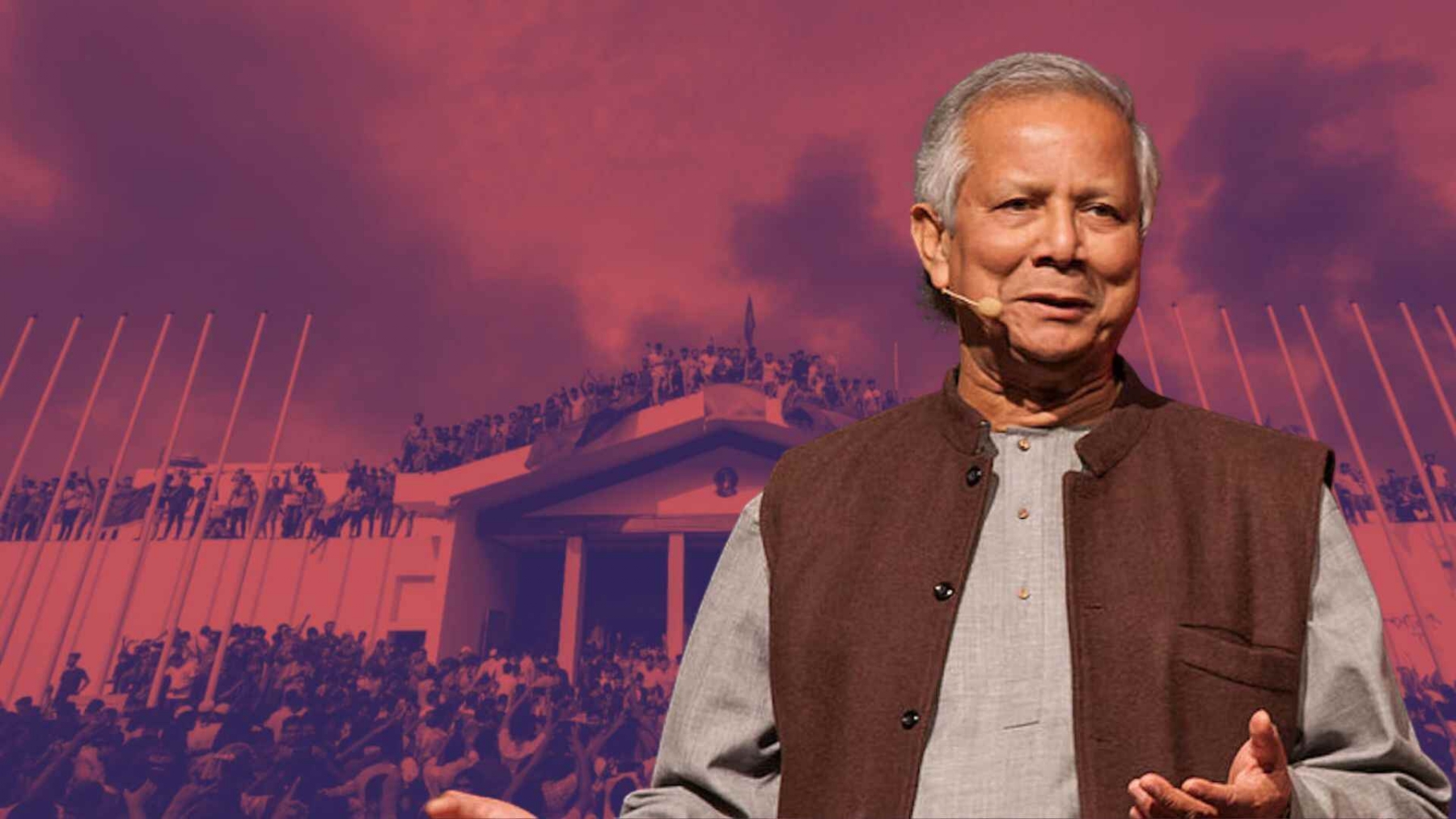
Approximately 100,000 weapons have been looted in Bangladesh, raising significant concerns about law and order in the region.
Tajul Islam has been appointed the Chief Prosecutor at the International Crimes Tribunal, which will look into cases against political prisoners.
Bangladesh Radio has started programs in Urdu, which Pakistan reportedly influences.
China has started making large-scale investments in Bangladesh, which signals a shift in the nation’s economic partnerships and geopolitical stance.
Following the recent illegal coup, there are growing concerns that Bangladesh is again becoming East Pakistan.
Bangladesh’s Hindu community is engaged in occupations such as teaching, agriculture, and small-scale businesses; they contribute significantly to the nation’s socio-economic framework. However, since the illegal coup in Bangladesh, the population of Hindus has been declining rapidly. This alarming trend underscores the urgent need for their protection.
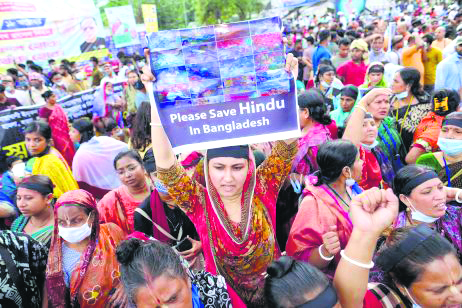
Many Hindu politicians are hiding, and approximately 1.25 lakh Hindus are forced to live on the outskirts. Hindu leaders and police officers are being arrested under fake charges, such as false murder accusations, further exacerbating their plight.
The government has reportedly coerced 1,500 Hindu teachers into resignation and enforced early retirements for Hindu personnel in the army and police forces, systematically marginalising them from public service roles.
Hindus are facing persecution across various spheres in Bangladesh. Hindu journalists, such as senior journalist Gaurab Kumar, have been targeted, with many arrested or even killed. The harassment of minorities is an essential issue as it is affecting their safety and livelihood.
Hindu festivals like Durga Puja are marred by incidents of violence, including stone pelting. The rise in Islamic extremist activities adds to the fear and insecurity faced by Hindus during these religious celebrations.
Many Reports indicate that 59% of violence against Hindus is directed at their temples, aiming to dismantle their places of worship and cultural heritage.
Hindu women and girls are harassed and forced to convert. There are abductions of girls. These practices also extend to other minorities, such as Buddhists, indicating an ongoing ethnic cleansing effort.
Mohammad Yunus and the Pakistani Prime Minister recently held a closed-door meeting, raising concerns about potential anti-India collaborations.
On 11 November, a cargo vessel travelled directly from Pakistan to Chittagong for the first time since 1971. Bangladesh has eased import restrictions on Pakistani goods. Notably, the mandatory physical inspection of imports from Pakistan has been removed, a measure that previously caused significant delays. This move indicates a growing alignment between Pakistan and Bangladesh, bypassing India’s strategic interests.
A memorandum has been signed by the Pakistani universities to promote Urdu teaching in Bangladesh. The Pakistan High Commission is actively involved in these kinds of initiatives, which could influence educational narratives in the region.
There are discussions about Pakistan and Bangladesh signing a nuclear treaty, along with agreements for military training. This is being driven by a pro-Pakistan lobby in Bangladesh, which has existed since the 1970s.
Some extremist groups in Bangladesh are propagating hateful narratives against India, including the use of Indian flags as doormats. This thinking reflects the rising anti-India sentiments among certain factions.
The culmination of these narratives and activities poses a significant threat to India’s national security and regional stability. The coordinated efforts of pro-Pakistan factions and radical groups in Bangladesh represent a critical challenge that must not be underestimated.
RSS General Secretary issued a statement on 30 November 2024, where he condemned the attack on minorities, and he appealed to the Indian government and global community to stand and support the victims of Bangladesh.
Introduction
On 5 June 2024, the High Court of Bangladesh reinstated a job quota system that reserves 30% of civil service positions for the children and grandchildren of those who participated in the Bangladesh Liberation War.
The next day, on 6 June, the Jamaat-i-Islami, a radical organisation’s student wing, initiated protests by blocking roads and essential locations, such as the police stations and major universities, i.e., the University of Dhaka, Jagannath University, Sher-e-Bangla Agricultural University, Rajshahi University, and the University of Chittagong.
This event was seen as an opportunity by China, Pakistan, and Radical Islamists to propagate their agenda and to create an anti-Bharat and anti-Hindu environment in Bangladesh.
This agitation cum political agenda later culminated in a coup against Prime Minister Sheikh Hasina and forced her to seek asylum in Bharat for her safety. Since then, the atrocities on Hindus have been happening.
One of the major and important Hindu organisations, Rashtriya Swayamsevak Sangh, condemns these attacks by saying, “The attacks, murders, looting, arson as well as inhuman atrocities by Islamic fundamentalists on Hindus, women and all other minorities in Bangladesh are extremely worrying.”
Current Situation
Immediately after the coup, an interim government was formed in Bangladesh under the Advisory of Muhammad Yunus. Since Prime Minister Sheikh Hasina resigned, everything has gone differently. A power vacuum appeared, occupied by three groups of political and ideological interests.
The Bangladesh Nationalist Party (BNP) became a dominant small business and significant economic group. In addition, the extreme militant political party Jamaat-i-Islami took control over Bangladesh’s administrative machinery.
However, a more serious threat to Bangladesh, as well as the whole subcontinent, is from Hizbul Tahrir because it is an extremist organisation that supports the Caliphate and has an influence on Bangladesh’s military.

These groups have demanded a more Islamized state, in which Hizbul Tahrir’s extremist ideology advocates for the implementation of Sharia law and the establishment of a global Caliphate.
Bangladesh’s “interim government,” under Chief Advisor Muhammad Yunus, has publicly committed to upholding human rights and freedom of speech. But the reality on the ground presents a contrasting picture. Since Yunus became the Advisor of the government, Bangladesh has witnessed a surge in human rights violations, such as mob lynching and violence against women and minorities.
It further alleges that the present administration has weaponised false cases against political opponents, members of law enforcement agencies, bureaucrats, lawyers and even judges, which resulted in a pervasive climate of fear and intimidation.
This can also be verified by the fact that Since the regime change in Bangladesh, there has been a systematic targeting of opposition figures, primarily from the Awami League and its allied organisations.
Over two dozen former ministers, including prominent figures such as Former Law Minister Anisul Haq, Former Adviser to Prime Minister Salman F. Rahman, Former Minister of Shipping Shahjahan Khan, Former Minister and the Awami League’s Joint General Secretary Dipu Moni, Former Minister of State for Home Affairs and Deputy Speaker Shamsul Haque, Former Commerce Minister Tipu Munshi, Former Food Minister Sadhan Chandra Majumdar are arrested or detained by the current despotic regime.
The ISKCON monks were also attacked by the current regime, and they are targeting the religious leaders of minorities; RSS also condems, “It is unjust for the Bangladesh government to send ISKCON monk Chinmoy Krishna Das, who is leading the Hindus in such peaceful demonstrations, to jail.”
The hypocrisy of the illegal interim government can be seen when the United Nations Human Rights wanted to establish an office in Bangladesh; the interim government issued contradictory statements. Sharmin S. Murshid, Social Welfare Adviser to the interim government, suggested that plans were underway to establish the office.
However, Foreign Affairs Adviser Touhid Hossain said no final decision was made regarding establishing any office. This uncertainty reflects a more profound concern within the interim government, which is killing and persecuting the rights of minorities.
The radical groups also oppose the establishment of a UN Human Rights office, arguing that it would threaten Bangladesh’s cultural and religious values and could promote agendas such as homosexuality.
The rise of these groups presents a significant threat not only to the secular nature of the Bangladeshi state but also to minorities, cultural diversity, and regional security.
Islamic Radicalism
The radicalism in Bangladesh is increasing day by day. After the illegal coup, the interim government granted bail to Mufti Jasimuddin on 26 August 2024, who is the chief of the Ansarullah Bangla Team, a militant group inspired by Al-Qaeda. Since the resignation of Sheikh Hasina, the attacks on minorities have surged.
Thousands of weapons have been looted by Islamic militants, who have targeted the homes of Hindus. Social media has become a powerful tool for radical Islamist forces in Bangladesh to reach and influence a targeted audience.
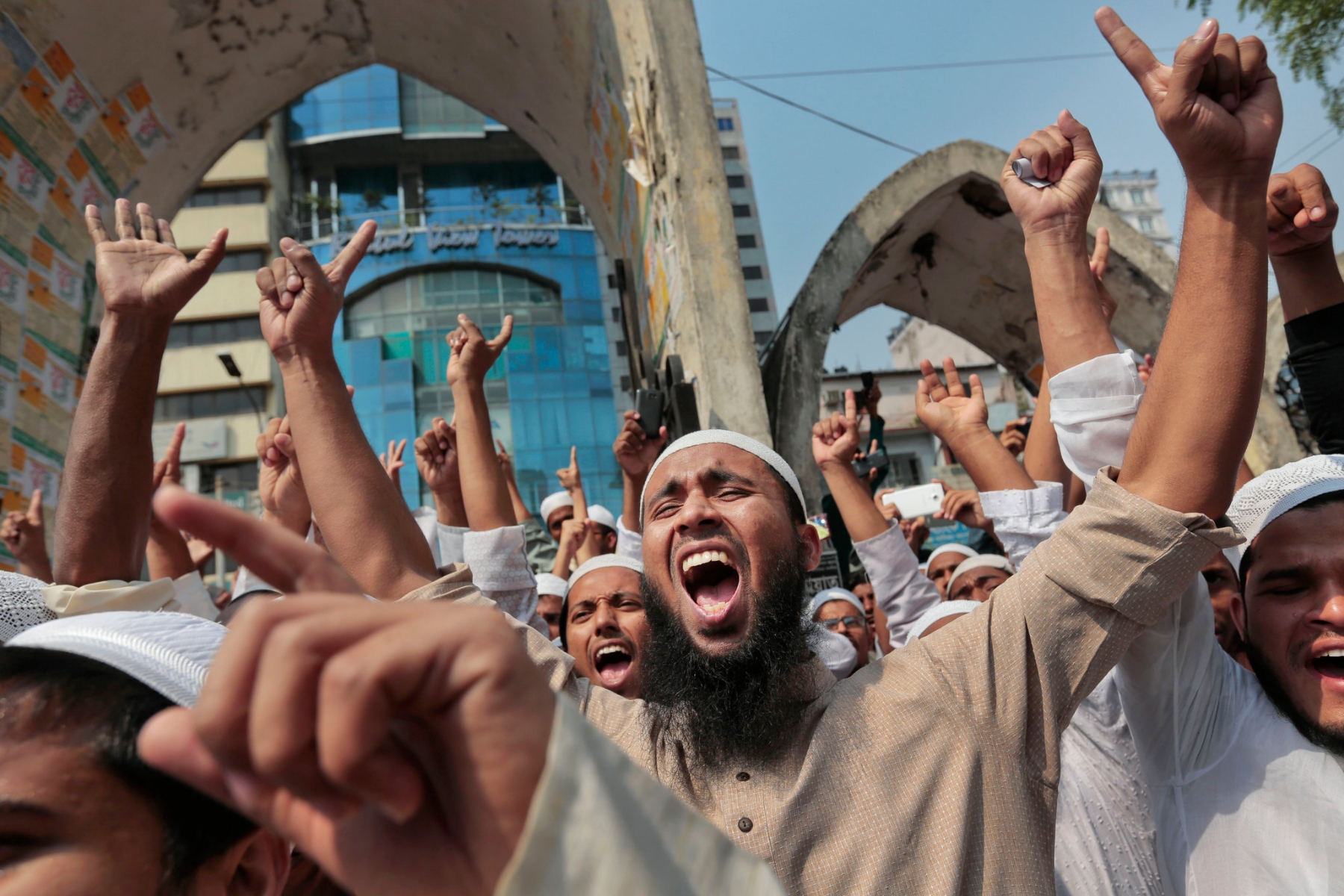
Platforms like YouTube and Facebook are usedto propagate radical ideologies, and prominent Islamic radicals such as Anayetullah Abbasi, Sheikh Ahmadullah Hafi, Maulana Mustafizur Rahman, Maulana Mahamudul Hasan and Maulana Sadiqur Rahman Azhari are leading this charge.
These Islamists crafted content and shared sermons and discussions that emphasised conservatism and extremist interpretations of Islam, engaging vast numbers of followers in Bangladesh and beyond.
Additionally, social media influencers like Zahid ur Rahman, Pinaki Bhattacharya, Golam Maula Rony, Elias Hossain, Taj Ul Hashmi, Jacob Milton, Zulkarnain Sakib, Abdur Rob Bhutto, Col. Mustafizur Rahman, and Kanak Sarwar have used these platforms to propagate the similar narratives against the Sheikh Hasina and his liberal policies.
Through a mix of religious rhetoric, critiques of secularism, and opposition to established political structures, Pak-backed-China-funded narrators have created a potent virtual ecosystem that fuels radical perspectives. Their content often seeks to amplify distrust in secular governance and promote the vision of an Islamic state.
Vandalism
There have recently been massive concerns about the increased vandalism of statues, temples, sculptures, and property belonging to minorities in Bangladesh. On 20 August 2024, one of the most famous Bangladeshi daily, Prothom Alo, brought to its readers an unfortunate string of cultural vandalism news that filled the whole of Bangladesh with shock and distress.
According to the news report, from 5 August to 14 August 2024, a total of 1,492 sculptures, relief sculptures (figures carved into walls with materials like ceramic or terracotta), murals, and memorials were targeted by vandals.
The vandalism was widespread and involved numerous divisions. There were 273 cases in Dhaka, 204 in Chattogram, 166 in Rajshahi, 479 in Khulna, 100 in Barishal, 129 in Rangpur, 49 in Sylhet, and 92 in Mymensingh.
Such occurrences reveal the increasing dominance of the radical Islamist philosophy, which is now driving attacks on Bangladeshi cultural identity and minority heritage.
Anti-Hindu Sentiments
The rise of radical Islam in Bangladesh has led to alarming levels of persecution against religious minorities, particularly the long-marginalised Hindu population. The socio-political and economic landscape for Hindus has become increasingly hostile.
Reports indicate that thousands of Hindu teachers have been forced to resign or retire under pressure, while tens of thousands of Hindu professionals have been coerced out of the state education sector, agriculture, and small businesses. This pattern reflects a broader effort to suppress the Hindu community and consolidate power among radical groups.
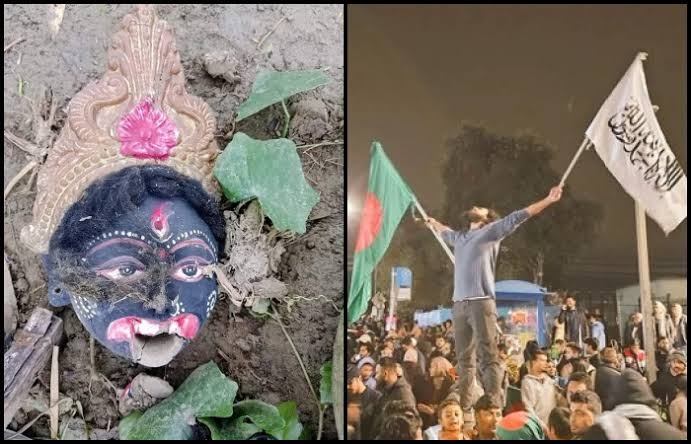
The escalation of persecution against Hindus has been remarkably increasing after the creation of the Interim government. Hindu communities have experienced violence, including forced conversions, kidnappings of women, and attacks on temples. RSS said on these attacks, “Out of helplessness, a new phase of injustice and atrocities seems to be emerging against the Hindus of Bangladesh to suppress the voice raised by them in a democratic way for self-defence.”
Anti-government agitation has given militant groups an opportunity to promote their agendas, specifically targeting Hindu communities.
It can also be seen in the case that over 50% of reported violence has been directed at Hindu temples and celebrations during Durga Puja. After the violence started in Bangladesh, armed mobs have attacked hundreds of Hindu temples across the country, including in Comilla, Maulavi Bazar, Noakhali, Khulna, Dhaka, Sirajganj, and Bogura. Tragically, many Hindus, Babul Chatterjee, Mrinal Chatterjee, Kajal Roy, and Suman Ghara, have been murdered by radical Islamist militant groups.
The government’s response to these radicals illustrates the involvement of leaders in systematically targeting religious minorities, which has resulted in the arrest or even murder of numerous Hindu leaders and journalists with police involvement. The Rashtriya Swayamsevak Sangh appeals to the Bangladesh government to ensure that the atrocities on Hindus in Bangladesh stop immediately and release Shri Chinmoy Krishna Das from imprisonment.
Influence of Pakistan and China
It seems that pro-Islamic, anti-Bharat groups, supported by Pakistan and China, are influencing Bangladesh’s political course. The recent activities indicate that Bangladesh’s foreign policy is steered more towards a pro-Pakistan approach. A significant event happened on 11 November 2024, when Bangladesh’s ports received cargo vessels directly from Pakistan, marking the first trade connection since 1971. This development can be seen as a sign of a possible realignment in Bangladesh’s foreign policy from Bharat to Pakistan.
A Report from Dainik Sathkhira on 8 September 2024 highlighted a visit by a Bangladesh Jamaat-i-Islami delegation, led by Secretary General Mia Ghulam Parwar, to the Pakistani High Commissioner’s office. The meeting underscored Pakistan’s efforts to rebuild ties and influence Islamist political factions in Bangladesh.
On 3 September 2024, Dhaka Tribune reported that High Commissioner Maroof met with Brigadier General (Retd.) Sakhawat Hossain, Advisor for Jute and Textile and Shipping Ministries, at the Secretariat in Dhaka. Hossain encouraged Pakistani investors to explore opportunities in Bangladesh’s state-owned textiles and jute mills, highlighting potential economic collaboration.
Even after that, Bangladesh’s deal with Pakistan over the teaching of Urdu in schools and its possibility to collaborate on nuclear training is yet another indication of increasing Pakistani influence on Bangladesh.
This does not seem to bode well for Bharat, as the country has a long border with Bangladesh and has been concerned about Pakistan-based radicals for decades. These foreign and domestic policy shifts raise important questions about the future direction of Bangladesh’s international relations and regional security dynamics.
The growing influence of Pakistan-based radical groups further exacerbates the situation. Social media platforms have become a battleground for spreading anti-Bharat narratives, with pro-Pakistan rhetoric gaining traction in certain circles. Radical groups like Hizbul Tahrir, with support from factions in Pakistan, are reportedly training militants in Bharat’s border regions to stir up unrest in Bharat’s north-eastern states. The possibility of further destabilising activities in these areas poses a significant threat to Bharat’s national security.
Anti-Bharat Activities
Bharat is emerging as a world leader and impacting the world. However, anti-Bharat elements are getting increasingly worried and have launched a sort of proxy war against the country. The BNP launched a “Boycott India” campaign in the last election, but after their defeat in the polls, when they lost the opportunity to pursue their Pakistan and China-oriented agenda, they used the 30% Quota agitation in Bangladesh as a foundation for anti-Bharat and anti-Hindu activities.
It’s also important to note that protests, which left-liberal circles and their self-proclaimed ‘scholars’ are portraying as student movements, are mostly inspired by those who want to divide Bharat.
Secondly, the present radical interim government in Bangladesh is also backed by China, Pakistan, and Islamic radicals that desire North-eastern Bharat to break away from the rest of Bharat. The situation in Bangladesh is fast becoming a launching pad for attacks on the strategic chicken neck.
There is a fear that Pakistan and Bangladesh may have some sort of military cooperation going on, including nuclear training, which is a threat to Bharat’s national integrity. Since the 1970s, there has been a pro-Pakistani lobby in Bangladesh who have been peddling the idea that Bhartiya flags should be used as doormats. This anti-Bharat narrative is dangerous and calls for serious attention.
Conclusion
In the end, we can say that Bangladesh is coming to a critical juncture wherein radical Islamist elements supported by Pakistan and China increasingly drive its political path. There has been massive violence in the form of brutal attacks on religious minorities by extremist groups like Jamaat-i-Islami and Hizbul Tahrir.
Further, political oppositions face increased repression under a pro-Pakistan attitude and even military and cultural alliances against regional security as well as Bangladesh’s secular roots.
With the growing targeting of minorities, cultural symbols, and anti-Bharat rhetoric, Bangladesh’s future direction comes with serious risks for both its internal stability and broader regional peace.